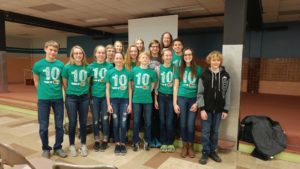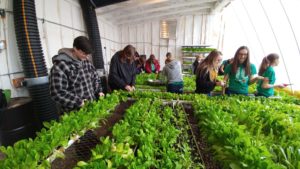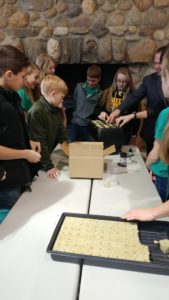Submitted by: Ali Dahmes, West Central YES! Coordinator
On February 28th, 2017, 19 students and 3 adults from Youth Energy Summit (YES!) teams at New London Spicer Middle School and Atwater Cosmos Grove City High School participated in the recent You Are What You Eat Winter Workshop starting at NL-S middle school and ending at Prairie Woods Environmental Learning Center. This workshop was a full day of horticulture learning about large scale production, current research, and getting advice for small scale backyard gardens.
Students began the day hearing from NL-S YES! students about the current projects they are working on including: designing and building a dock for their outdoor education space, harvesting in their  greenhouse, preliminary work on possible solar array on the new gym addition, implementing a tree trench after construction is finished at school, and planting fruit trees. Students also learned how NL-S has successfully implemented bulk milk in their cafeteria to reduce carton waste as well as improving milk quality and taste. Teams then got the chance to see the NL-S green house and harvest lettuce.
greenhouse, preliminary work on possible solar array on the new gym addition, implementing a tree trench after construction is finished at school, and planting fruit trees. Students also learned how NL-S has successfully implemented bulk milk in their cafeteria to reduce carton waste as well as improving milk quality and taste. Teams then got the chance to see the NL-S green house and harvest lettuce.
The rest of the day took place at Prairie Woods Environmental Learning Center were students heard from Steve Poppe, a senior horticulturist with the University of Minnesota’s West Central Research and Outreach Center. Steve informed the students about the research the University is correctly undertaking including wintering cover crops and extending strawberry growth in Minnesota. Their ability to successfully overwinter cover crops in a harsh environment decreases top soil loss as well as removing the need to put commercial fertilizer on crops the following year! They are also growing strawberries longer than usual in MN and the strawberries they are producing are “2,000 miles fresher” as Steve says. They are  not only fresher but they also taste better due to a higher sweetness level. Plus, if this goes large scale in Minnesota, strawberries will not have to be trucked in from California therefore reducing emission from transportation. After Steve Poppe, they heard from Dana Anderson, a local from Green Lake, CEO of Living Greens Farm. Dana stressed that “according to the World Wildlife Fund (2011) Humans will consume more food in the next 40 years than they have in the last 8,000 years” and something needs to happen to feed everyone. He spoke about the innovation of vertical aeroponics he has done with Living Greens Farm. Aeroponics is the process of growing plants in a mist environment without the use of soil and Dana has taken this concept and is now using it for large scale production. Vertical aeroponics uses 95% less water and 99.5% less land than traditional land agriculture! Not only does it use less water and land, there is a lower pathogen risk, doesn’t use pesticides, has low transportation involvement, and it is highly productive. He then allowed the students to build and keep their own aeroponic system!
not only fresher but they also taste better due to a higher sweetness level. Plus, if this goes large scale in Minnesota, strawberries will not have to be trucked in from California therefore reducing emission from transportation. After Steve Poppe, they heard from Dana Anderson, a local from Green Lake, CEO of Living Greens Farm. Dana stressed that “according to the World Wildlife Fund (2011) Humans will consume more food in the next 40 years than they have in the last 8,000 years” and something needs to happen to feed everyone. He spoke about the innovation of vertical aeroponics he has done with Living Greens Farm. Aeroponics is the process of growing plants in a mist environment without the use of soil and Dana has taken this concept and is now using it for large scale production. Vertical aeroponics uses 95% less water and 99.5% less land than traditional land agriculture! Not only does it use less water and land, there is a lower pathogen risk, doesn’t use pesticides, has low transportation involvement, and it is highly productive. He then allowed the students to build and keep their own aeroponic system!
“It is not that I am so smart, it’s just that I stay with problems longer” –Albert Einstein
